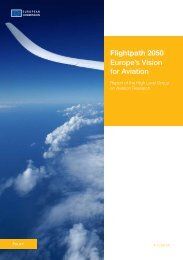Create
Final Report - Acare
Final Report - Acare
- No tags were found...
Create successful ePaper yourself
Turn your PDF publications into a flip-book with our unique Google optimized e-Paper software.
THE<br />
APPENDICES<br />
I.<br />
When the concept is assessed, and if incubation<br />
is approved, the existence of any specific and<br />
relevant background will need to be recorded<br />
before incubation starts if the owner of it<br />
considers it important. The ownership of the<br />
IPR created during incubation will, according<br />
to the principles of the FPs rest with the<br />
agency that does the work.<br />
There are two potential problems that might<br />
arise in practice:<br />
a) The main part of the knowledge<br />
accumulated during incubation will belong<br />
to the incubation contractor. This knowledge<br />
will perhaps be significant and may influence<br />
the way in which the concept is developed<br />
thereafter. It does not, of course, dictate that<br />
the incubation contractor must continue to<br />
be a leading player but they would have<br />
to agree to license relevant and necessary<br />
Foreground on “fair and reasonable terms”<br />
– which are capable of interpretation. The<br />
incubation contractor would, for practical<br />
as well as for IPR reasons probably become<br />
a favoured source for future research<br />
work unless, as might well be the case,<br />
their expertise was related solely to some<br />
issues, perhaps particular risks, within the<br />
incubation contract.<br />
b) Given our recommendation that incubation<br />
will be funded at 95% – it is likely that such<br />
an assignment of IPR would be a significant<br />
motivating factor for participation.<br />
The nature of CREATE-type ideas will mean<br />
in most cases that the incubation contractor<br />
will not be in a position to exploit the idea<br />
commercially. The CREATE recommendation is<br />
therefore that any contractor working on an<br />
incubation level project should be required to<br />
undertake, before the award of the incubation<br />
contract, that he will make available on<br />
fair and reasonable terms the Foreground<br />
knowledge created in the incubation to<br />
any subsequent research or development<br />
contractor seeking to exploit the idea.<br />
At the end of Incubation the contractor will<br />
need to record any specific and relevant<br />
knowledge that he has accumulated and<br />
asserts ownership over. This will become<br />
background material that enters later research<br />
and development projects.<br />
Specific and Relevant Knowledge:<br />
It is clear from general IPR practice and<br />
from the EC Guide on IPR for FP7 that the<br />
background knowledge that is protected<br />
by the principles is confined to that specific<br />
information that is necessary for the discharge<br />
of the project including that necessary to the<br />
use of the Foreground knowledge. The partner<br />
(in FP7 projects) has to make that background<br />
knowledge available to the project but is not<br />
bound to dilute his ownership of it. There is no<br />
sense in which the participant can claim that<br />
other information, e.g. his general body of<br />
knowledge, not necessary to discharging the<br />
project, should be covered by the principles.<br />
It is likely in CREATE, therefore, that claims by<br />
originators to bring important background<br />
knowledge to the party will infrequently be<br />
successful – and probably not be made. The<br />
role of Expert Advisers might also be overcome<br />
by setting the conditions of their contribution<br />
to exclude any knowledge that the expert<br />
believes to be his proprietary knowledge.<br />
Access Rights:<br />
It is a principle of the EC that Access Rights<br />
for use purposes (i.e. in further research<br />
or for exploitation) may be requested by a<br />
participant only if it needs them for using its<br />
own foreground resulting from the project. In<br />
all other cases it may negotiate access rights<br />
but there is no requirement for these to be<br />
granted by the holder.<br />
The EC Guide to IPR 12 in FP7 says “Access rights<br />
for use purposes, both to background and to<br />
foreground, may be granted either royaltyfree,<br />
or on fair and reasonable conditions to<br />
be agreed. Participants may of course opt<br />
for a combination of the two (for example<br />
royalty-free for further research purposes and,<br />
as is often the case, on fair and reasonable<br />
conditions for other use purposes). Under<br />
FP7, the conditions for such access rights can<br />
be agreed at any time, which means that<br />
the choice between royalty-free and fair and<br />
reasonable conditions need not be made<br />
before the signing or acceding to the grant<br />
agreement. However, making this choice<br />
before may be preferable for reasons of<br />
legal certainty. For instance, certain potential<br />
participants may prefer to pull out of the<br />
project before it starts, rather than embarking<br />
in it under detrimental conditions (if the terms<br />
and conditions appear to be unacceptable).”<br />
This has clear signals for the CREATE process<br />
and may come into play during incubation.<br />
1 Reference: Guide to Intellectual Property Rules for FP7<br />
projects by the European Commission. Version 2<br />
89



